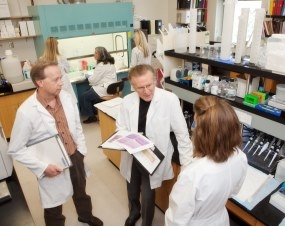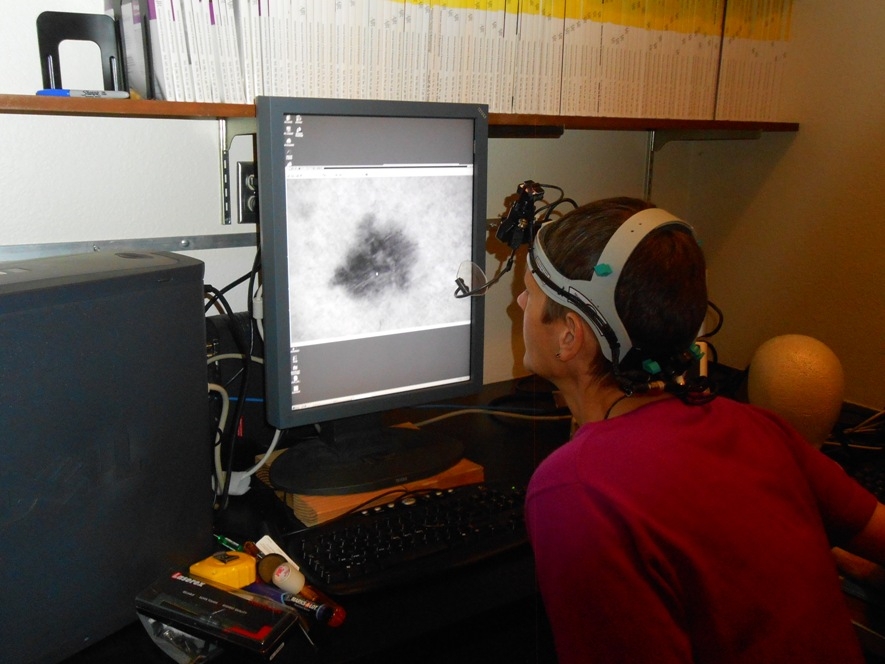From disease origins to prevention and treatment, unraveling the science of skin cancer requires innovative research. The University of Arizona Cancer Center has been a leader in skin cancer research for decades.
The Skin Cancer Institute brings together nationally recognized scientists to collaborate in the discovery of:

- Cutting-edge chemical agents to prevent skin cancer and reverse sun damage
- New and better treatments for skin cancer
- Improved early detection techniques
- How skin cancer develops and spreads
- Ways to help people change unhealthy sun-related behavior
The Skin Cancer Institute offers a variety of research studies to eligible patients and their family members. This research includes:
Clinical Trials
Clinical trials are biomedical or health-related research studies conducted in humans, that study the use of specific therapies to treat or prevent skin cancers. These studies are guided by detailed protocols and are approved by an institutional or ethical review board.
Phase 1 and Phase 2 clinical trials of new topical drugs for skin cancer prevention, developed by SCI scientists and physicians are ongoing. Promising results from these studies will be used to further advance our drug and development efforts.
See a list of open clinical trials for melanoma and other skin cancers at The University of Arizona Cancer Center: Find a Clinical Trial.
Epidemiologic Research
Epidemiologic or population research focuses on the impact of disease on entire human populations instead of individuals. The research attempts to link human health effects to a cause. For example, the effects of environment and/or genetic factors on skin cancer within a population.
Patient Registry and Tissue Bank
The Skin Cancer Institute Patient Registry and Tissue Bank collect information on skin cancer incidence in Southwest Arizona. The purpose of the Registry and Tissue Bank is to create a repository to be used by doctors and researchers to better understand the causes of skin cancer. The data collected will describe both the individual with the skin cancer, and the characteristics of the skin cancer itself. By studying personal histories, medical records, blood, saliva and tissues from thousands of patients, we hope to find better ways to treat and prevent skin cancer.
During recruitment phases, patients who are seen in the dermatology clinic at The University of Arizona Cancer Center - North Campus are given a clinic questionnaire to complete before their appointment. If the patient selects the ‘interested in registry’ box on the last page, a staff member will talk to him or her after their appointment. Patients are asked to complete a registry questionnaire and give a small sample of saliva. Blood samples may be collected at future visits. The patient’s medical records are reviewed, and samples of tissue collected from biopsies and surgeries may be requested from the patient’s physicians.
We also need participants who have been diagnosed with actinic keratosis for the registry. Learn more about being part of the AK registry here.
Behavioral Research
Behavioral research is the study of cognitive factors (mental processes of perceiving, thinking, and remembering), affective factors (emotion), attitudes, and beliefs that may or may not influence use of skin cancer prevention or sun protection behaviors. For example, previous studies conducted by team members have examined the behavioral responses to a diagnosis of skin cancer and factors such as risk perception and cancer worry that affect risk-reducing behaviors.
Basic and Translational Research
Basic research is the foundation of medical discovery, while translational research is the process of taking a discovery from the laboratory into the clinic. The goal of translational research is to produce results that directly benefit human health. Current areas of The University of Arizona Basic and Translational Research include:
- Skin biology - understanding how skin cancer develops
- Skin cell regulation - understanding molecular signals that control skin cells
- Photobiology - understanding how sunlight affects skin and skin cancer
- Drug development - design and discovery of new drugs to prevent and treat skin cancer
- Clinical trials - testing new drugs and treatments in patients with skin cancer or sun damaged skin
One major project within the Skin Cancer Institute is the Chemoprevention of Skin Cancer Program Project, led by Dr. Clara Curiel, Principal Investigator.
The Chemoprevention of Skin Cancer Program Project grant is funded by the NIH-NCI. The overall goal of this grant is to develop new strategies to eradicate intraepithelial neoplasias (IENs) in the skin and dramatically reduce the risk of skin cancer. The grant consists of basic, translational, and clinical research projects and includes leading researchers at the University of Arizona as well as Loyola, Stanford, and the University of Minnesota. In addition, there are four cores to support these projects – Administration, Biometry, Biomarkers, and Drug Development. The clinical trials conducted on this grant aim to develop new treatments for the prevention of skin cancer. Individuals who are interested in learning more about the clinical trials can call (520) 321-7747.
There have been multiple research discoveries as a result of the basic and translational science conducted by Skin Cancer Institute members. These include:
- Molecular signaling pathways in skin cancer cells were uncovered that help explain how sunlight can alter normal skin cell growth leading to cancer.
- Several new drugs derived from plants and other natural products were tested and shown to block these pathways in skin cell models - the first step in new drug discovery and development for skin cancer.
- Comparisons between mouse skin and human skin were performed to validate that mouse models of skin cancer accurately reflect human skin cancer, and can serve as a testing system for new skin cancer drugs (featured in an article that appeared on the cover of the journal Photochemistry and Photobiology).
- One of our lead drugs, myristyl nicotinate, was shown to enhance skin barrier function as a means to protect and improve skin health, and was successfully tested in a Phase 1 clinical trial.
- New biomarkers in skin have been discovered that may soon be used to distinguish dangerous and aggressive skin cancers from benign cancers, improving treatment outcomes.
- New biomarker technologies are being incorporated into clinical trials to determine “molecular network signatures” that could lead to individualized therapies for treatment and prevention of skin cancer.
- New imaging technologies developed by SCI scientists including computerized whole-body mole mapping and tracking; nuclear karyometry; and optical coherence tomography; will result in earlier detection of precancers that can be removed before developing into skin cancer.
The SCI strives to foster discoveries in all areas of skin cancer research. This is why we offer seed grants designed to help University of Arizona researchers test novel ideas for prevention, detection and treatment of melanoma and other skin cancers. To learn more, visit our Seed Grant page.



